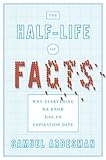|
In
today's selection -- in 1870, a German chemist made an error in
transcribing the data on how much iron was in spinach, providing a lesson
in the spread and persistence of erroneous information in society:
"One
of the strangest examples of the spread of error is related to Popeye the
Sailor. Popeye, with his odd accent and improbable forearms, used spinach
to great effect, a sort of anti-Kryptonite. It gave him his strength, and
perhaps his distinctive speaking style. But why did Popeye eat so much
spinach? What was the reason for his obsession with such a strange food?
"The
truth begins more than fifty years earlier. Back in 1870, Erich von Wolf,
a German chemist, examined the amount of iron within spinach, among many
other green vegetables. In recording his findings, von Wolf accidentally
misplaced a decimal point when transcribing data from his notebook,
changing the iron content in spinach by an order of magnitude. While
there are actually only 3.5 milligrams of iron in a 100-gram serving of
spinach, the accepted fact became 35 milligrams. To put this in
perspective, if the calculation were correct each 100-gram serving would
be like eating a small piece of a paper clip.
"Once
this incorrect number was printed, spinach's nutritional value became
legendary. So when Popeye was created, studio executives recommended he
eat spinach for his strength, due to its vaunted health properties.
Apparently Popeye helped increase American consumption of spinach by a
third!
"This
error was eventually corrected in 1937, when someone rechecked the
numbers. But the damage had been done. It spread and spread, and only
recently has gone by the wayside, no doubt helped by Popeye's relative
obscurity today. But the error was so widespread that the British
Medical Journal published an article discussing this spinach
incident in 1981, trying its best to finally debunk the issue.
"Ultimately,
the reason these [types of] errors spread is because it's a lot easier to
spread the first thing you find, or the fact that sounds correct, than
to delve deeply into the literature in search of the correct fact."
Author: Samuel Arbesman
Title: The Half-Life of
Facts
Publisher: Penguin Group
Date: Copyright 2012 by
Samuel Arbesman
Pages:
83-84
 The Half-life of Facts: Why Everything We Know Has an
Expiration Date The Half-life of Facts: Why Everything We Know Has an
Expiration Date
by Samuel Arbesman by Current
Hardcover
Hardcover
|


No comments:
Post a Comment